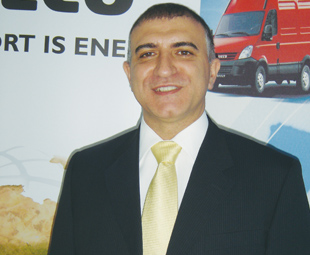Italian innovation

In the aftermath of the financial devastation of 2009, industries and companies around the world are taking stock of their positions. FOCUS established how Iveco weathered the storm, its plans for 2010 and its position in the hotly-contested African market. That an economic crisis descended upon industries and manufacturers around the world in late 2008 is beyond dispute yet, despite the shock of transport markets suddenly shrinking, Iveco has chosen to view the glass as half full rather than half empty.
“The daily efforts and sacrifices of Iveco staff around the world over the past year have actually led to a positive result for us,” says Raffaele Di Donfrancesco, sales and marketing: Africa, Middle East and Central Asian markets, general manager, Iveco. “Our sales only suffered a 15% contraction compared to the 45% contraction of the overall market. This is not only a victory for the group, but an indication of how the combination of our global presence and changing DNA in light of global developments have stood us in good stead.”
As a member of the Fiat Group, Iveco is the commercial transport arm of a global entity that encompasses passenger cars, light and medium commercial vehicles, trucks, and heavy earth-moving equipment. Fiat brands can be found around the world, with Iveco’s reputation for quality trucks renowned for strength and durability known from Russia to Africa and South America.
“At 25% we hold a substantial market share in the extra-heavy commercial vehicle sector in Northern Africa,” confirms Di Donfrancesco. “This is naturally an important market for us, but the fact that we have such a global presence is what makes our success in these markets possible – particularly when the global economy contracts.”
Iveco’s presence in transport centres around the world has allowed the manufacturer to remain strong in the face of the storm. “Europe is our home market and remains our important starting point as a manufacturer, but the number of markets we are involved in has allowed us to remain strong, which in turn allows us to support all our clients across the globe,” says Di Donfrancesco.
The manufacturer’s foothold in such diverse markets world-wide did not happen overnight, but is rather the culmination of decades of experience in the trucking market and the decision to design and build trucks ideally suited for a wide array of different transport conditions.
Whereas the European market is dominated by on-road long hauliers, the African, South American and Middle Eastern markets demand a much tougher product.
“We adapt our trucks according to the mission they will need to carry out,” Di Donfrancesco explains. “Reinforced chassis and drivelines are just the starting points for trucks built to last in these conditions. We are adaptable and, as a result, we have not only built a range of trucks fully dedicated to conquering the tough conditions of these diverse regions, but we have built them well. Our reputation precedes us in many of the toughest operating areas in the world.”
While Iveco’s global presence has undoubtedly played a role in the manufacturer’s ability to handle the economic downturn, the company has also adapted to meet the change in operating conditions created by the crisis.
“Since 2008 the inherent weakness of the commercial transport industry has been revealed to all of us, transport operators and manufacturers alike. It is that ours is a market led by other industries and markets,” says Di Donfrancesco.
“This means we have had to be even more innovative, creative and in tune with our customers’ various needs than other industries. Yes, we have been able to draw on our wide range of products and markets to remain financially stable; but we have also had to change our way of doing business,” he continues.
“Iveco has always spoken of ‘transport as energy’ and it is this ideal that has allowed us to adapt our mindset and way of doing business. We have always possessed an enormous capacity for creating and nurturing relationships with our clients, but we now take this a step further and use our creativity to support their operations. Energy is about working together, so that we can all weather this storm and emerge even stronger than we were going into it.” Operators can be sure this energy will be focused on the important Southern African market in 2010.
Published by
Focus on Transport
focusmagsa



